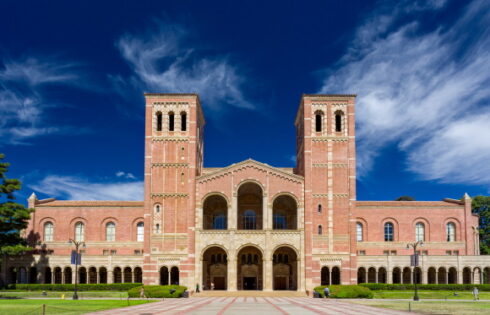
Underestimated cleanup costs by $100,000
Indiana University at Bloomington won’t say whether pro-Palestinian protesters have paid, or will pay, for the more than $250,000 in damages caused during a pro-Palestinian encampment at Dunn Meadow.
The College Fix could not get an answer from either Indiana University or the Indiana Higher Education Commission regarding where the money for the repairs is coming from, and more specifically, whether the university would attempt to get the activists to cover part of the costs stemming from their activities a full year ago.
Executive Director of Media Relations Mark Bode did not respond to two emails and a voicemail in the past six weeks. He oversees communications for the entire IU system. The Fix additionally emailed and left a voicemail with Bode on Thursday, again asking for comment about any plans to pursue restitution.
The IU-Bloomington’s Office of Student Life, which oversees student conduct cases, also did not respond to an email and voicemail left on Thursday morning, as well as an email sent in the past weeks. The Fix called and emailed spokesman James McHaley to ask about restitution. Facilities management, the dean of students, and Vic Ryckaert, IU’s spokesman for Bloomington, also have not responded in the past weeks.
Allison Kuehr, the communications director for the Indiana Higher Education Commission, deferred to Bode when reached by The Fix.
The total damages cost $265,599.15, according to information the university provided the Indiana Daily Student.
It includes $38,127.02 for sidewalk repair, $99,616.17 for sod repair, and $5,525.75 for graffiti removal. The initial estimates were for $100,000, according to the student newspaper.
The pro-Palestinian encampment began on Dunn Meadow in April 2024, led by the Indiana University Divestment Coalition. A video shared on the Coalition’s Instagram page shows what appears to be hundreds of protesters at Dunn Meadow advancing on police officers. “The people united will never be defeated,” the caption states
The Fix contacted the Coalition on March 1, asking if the group had received contact from the university about the Dunn Meadow repair costs. It has yet to respond.
Civil liberties experts had different views on whether the university should seek to reclaim costs from protesters.
Alex Morey, with the Foundation for Individual Rights and Expression, said there were three general types of behavior that took place during the Dunn Meadow encampment, which included protected free speech, such as sign holding, non-violent civil disobedience, and misconduct and criminality.
These activities, some protected and some not, can make it difficult to tell who should be punished, especially since Dunn Meadow has a history of hosting protests, Morey, an attorney, told The Fix via email.
“When student groups host speakers or special events on campus, they often get permission and sign contracts with the school, agreeing to pay for incidental damage,” Morey said. “But this is different from a situation in which organic protest activity crops up on campus. Students have every right to take advantage of being at a public university and participate in speech activity on that campus.”
“This is not just a First Amendment right, but a longstanding norm in higher ed,” she continued. “Protest on college campuses, whether it’s about Israel or Vietnam, Apartheid or Abortion, suggests a healthy climate for free speech.”
Pursuing restitution usually happens through the legal system, Morey said, which prevents seeking repair costs acting “as something of a speech tax levied against students with unpopular views.”
Morey pointed to examples of conservative groups being charged security fees for hosting speakers such as Ben Shapiro.
“In the same way, it’s just as unconstitutional for schools to charge students for engaging in lawful protest activity,” Morey said. “If that activity is significant, as it will be from time to time, that cost is the university’s to bear. A core part of being a public university, after all, is hosting a variety of viewpoints.”
Ultimately, it’s the job of university officials “to dip into their multi-billion-dollar endowments” for both Republican and pro-Palestinian events.
Morey said: “The purpose of a university is to foster an environment where even controversial views can be discussed and debated. To the extent that requires budgeting, whether for a gardener or a security guard, it’s money well spent.”
However, accomplished litigator and civil liberties expert John Banzhaf disagrees.
The George Washington University law professor said Indiana University “should definitely sue the students responsible, or at very least those who can be identified” for criminal behavior, including trespassing as well as other potential crimes such as “malicious mischief, trespass to property such as posting graffiti.”
Not doing so, Banzhaf argued, would be unjust to students who didn’t cause the damages and might see tuition increases as a result. Another consideration is the duty of the university to protect its property. Not punishing students for destroying property encourages such behavior in the future.
“A failure to bring such an action could make the trustees of the university liable for a clear breach of their fiduciary duty to protect the property and other resources of the university by taking legal action to obtain compensation for major damages when legal liability is so clear,” Banzhaf said.
Banzhaf has supported using class-action lawsuits to discourage destructive protest behavior in previous cases, such as the January 6 riot.
MORE: UMinn ‘intersectional medieval art’ class explores ‘transgender saints’
IMAGE: IU Divestment Coalition/Instagram
Like The College Fix on Facebook / Follow us on Twitter






Please join the conversation about our stories on Facebook, Twitter, Instagram, Reddit, MeWe, Rumble, Gab, Minds and Gettr.